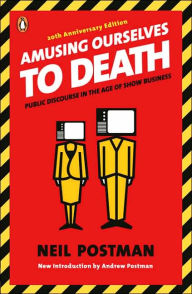The meeting itself was an exchange of pleasantries with Postman saying something snarky and wise that I likely didn't catch. He lived in a typical high-rise apartment near Washington Square Village, and the meeting didn't mean much to me. It was only later in life that I came to appreciate his innovative work.
I recommend Amusing Ourselves to Death: Public Discourse in the Age of Show Business (1985) by Postman to anyone who's watched TV or held a cellphone or anyone who's heard of those devices. So, yeah, I guess that's pretty much all of civilized humanity.
Amusing Ourselves to Death focuses on TV, and its main point works off Marshall McLuhan's famous assertion that "the medium is the message." Postman hones in on how public discourse has degenerated in the TV era and how the sound byte has replaced meaningful discourse. I couldn't agree more with the thesis. I'd buy that for a dollar!
Back in 1985, he was saying that public discourse had become dangerous nonsense. We entered a world of "constant corporate conversations" in which cosmetics replaced ideology. In the introduction, he points out the distinctions between futurists George Orwell and Aldous Huxley. Whereas Orwell feared those who would ban books, Huxley feared there would be no reason to ban books.
Orwell argued that what we hate would ruin us, while Huxley argued what we love would ruin us. Huxley predicted we would come to love our own technology and oppression, and Postman's book is about how Huxley was 100 percent correct.
By the time the average American reaches age 65, that person would have spent 12 uninterrupted years in front of a TV. I believe that fact stays hidden from Americans because the average American is uneducated and doesn't have the ability to realize he's, more or less, or a mindless consumer and worker.
However, mindless TV is not exactly the problem. Postman makes a clear distinction between entertainment, such as the show Cheers, and political debates and news. The harm isn't in the idiot box entertainment we watch, but rather in the blending of important issues wrapped up into news hours, punctuated by commercial breaks. Meaningful discourse is lost.
I say we can multiply that meaningless discourse when we consider the scrolling, five-second YouTube ad newer media that has infiltrated us. We've warped into meaningless hyperdrive.

Great review Joe!
ReplyDeleteThanks, my man!
ReplyDelete